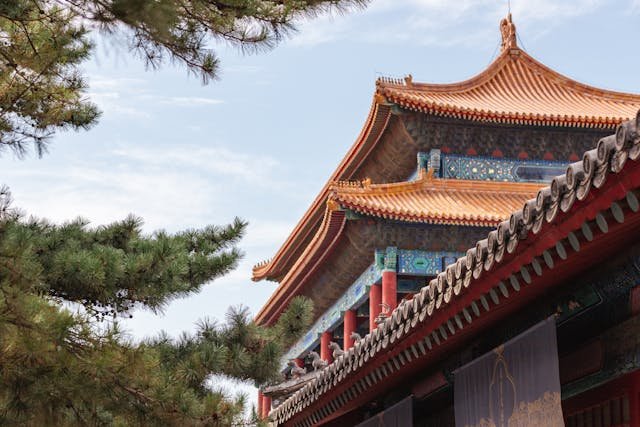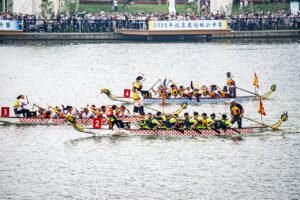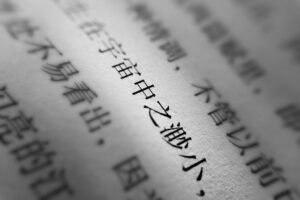China’s National Day (国庆节, guóqìng jié), celebrated on October 1st, marks the anniversary of the founding of the People’s Republic of China in 1949. This significant event is commemorated across the country with vibrant displays of national pride, from large-scale parades and military exhibitions to fireworks, cultural performances, and family gatherings. For Chinese language learners, National Day offers an excellent opportunity to engage with the language and culture more deeply, learning not just about the holiday but also expanding their vocabulary and understanding of key expressions.
In this article, we will explore essential Chinese vocabulary and expressions related to National Day. Whether you’re planning to travel in China during this period, participate in local celebrations, or simply want to enhance your Chinese proficiency, these words and phrases will enrich your learning experience.
If you are looking to improve your Chinese language skills and immerse yourself in Chinese culture, consider enrolling in the flexible Chinese courses offered by LC Chinese School in Oslo. These courses cater to various levels and offer a tailored approach to mastering both language and cultural knowledge.
Table of Contents
Toggle1. Basic National Day Vocabulary
1.1 国庆节 (Guóqìng Jié) – National Day
Let’s start with the most important term: 国庆节. The word “国” (guó) means “country,” while “庆” (qìng) means “celebrate,” and “节” (jié) means “festival” or “holiday.” Together, “国庆节” translates to National Day, a holiday that commemorates the founding of the People’s Republic of China. It’s a term you’ll hear frequently in both formal and informal conversations during the holiday season.
Example Sentence:
十月一日是中国的国庆节。
Pinyin: Shíyuè yīrì shì Zhōngguó de Guóqìng Jié.
Translation: October 1st is China’s National Day.
1.2 庆祝 (Qìngzhù) – To Celebrate
The word 庆祝 is used to describe the act of celebrating something important. It’s a key word you’ll hear often during National Day festivities as people talk about how they are going to celebrate the holiday.
Example Sentence:
我们计划和朋友们一起庆祝国庆节。
Pinyin: Wǒmen jìhuà hé péngyǒu men yīqǐ qìngzhù Guóqìng Jié.
Translation: We plan to celebrate National Day with friends.
1.3 阅兵 (Yuèbīng) – Military Parade
One of the most iconic events of China’s National Day is the 阅兵 or military parade. These parades showcase China’s military strength and serve as a significant display of national pride. The term 阅 (yuè) means to “review” or “inspect,” and 兵 (bīng) means “soldiers.”
Example Sentence:
每年的国庆节都会举行盛大的阅兵仪式。
Pinyin: Měinián de Guóqìng Jié dōu huì jǔxíng shèngdà de yuèbīng yíshì.
Translation: Every year, a grand military parade is held on National Day.
1.4 升旗 (Shēngqí) – Flag Raising
升旗 means “flag raising,” a ceremony that plays a prominent role during National Day celebrations. The Chinese national flag, the 五星红旗 (Wǔxīng Hóngqí, Five-Star Red Flag), is raised at various official locations, most notably in Tiananmen Square in Beijing.
Example Sentence:
我们早上去天安门广场看升旗仪式。
Pinyin: Wǒmen zǎoshang qù Tiān’ānmén Guǎngchǎng kàn shēngqí yíshì.
Translation: We went to Tiananmen Square in the morning to watch the flag-raising ceremony.
1.5 天安门广场 (Tiān’ānmén Guǎngchǎng) – Tiananmen Square
Tiananmen Square, or 天安门广场, is one of the most famous landmarks in China. It’s a site of great historical importance and the location of many National Day activities, including the flag-raising ceremony and large public gatherings.
Example Sentence:
国庆节那天,天安门广场上有很多游客。
Pinyin: Guóqìng Jié nà tiān, Tiān’ānmén Guǎngchǎng shàng yǒu hěn duō yóukè.
Translation: On National Day, Tiananmen Square is filled with tourists.
1.6 烟火 (Yānhuǒ) – Fireworks
Fireworks, or 烟火, are a common feature of National Day celebrations. Major cities across China, including Beijing and Shanghai, host magnificent firework displays to mark the occasion.
Example Sentence:
晚上我们可以去看国庆节的烟火表演。
Pinyin: Wǎnshàng wǒmen kěyǐ qù kàn Guóqìng Jié de yānhuǒ biǎoyǎn.
Translation: In the evening, we can go watch the National Day fireworks show.
1.7 庆典 (Qìngdiǎn) – Celebration/Ceremony
A 庆典 is a large-scale celebration or ceremony, and it’s a word often used to describe the official events held in honor of National Day. These include parades, concerts, speeches, and public performances.
Example Sentence:
国庆节的庆典在全国各地举行。
Pinyin: Guóqìng Jié de qìngdiǎn zài quánguó gèdì jǔxíng.
Translation: National Day celebrations are held all over the country.
2. Expressions for National Day Greetings
2.1 国庆快乐 (Guóqìng Kuàilè) – Happy National Day
A straightforward and common way to wish someone well during the holiday is to say 国庆快乐, meaning “Happy National Day.” This greeting is equivalent to wishing someone a Merry Christmas or Happy New Year.
Example Sentence:
祝你国庆快乐,假期愉快!
Pinyin: Zhù nǐ Guóqìng kuàilè, jiàqī yúkuài!
Translation: Wishing you a Happy National Day and a pleasant holiday!
2.2 祖国万岁 (Zǔguó Wànsuì) – Long Live the Motherland
During National Day celebrations, especially in formal settings or during military parades, you may hear the phrase 祖国万岁, meaning “Long Live the Motherland.” This expression is deeply patriotic and is often used to express love and loyalty to China.
Example Sentence:
阅兵结束时,士兵们高喊“祖国万岁”!
Pinyin: Yuèbīng jiéshù shí, shìbīngmen gāohǎn “Zǔguó wànsuì”!
Translation: At the end of the military parade, the soldiers shouted, “Long live the motherland!”
2.3 爱国精神 (Àiguó Jīngshén) – Patriotic Spirit
爱国精神 refers to “patriotic spirit,” which is often discussed during National Day as people reflect on the importance of loving and serving their country. It’s a term that encapsulates the sense of pride and duty associated with the holiday.
Example Sentence:
国庆节期间,我们应该发扬爱国精神。
Pinyin: Guóqìng Jié qíjiān, wǒmen yīnggāi fāyáng àiguó jīngshén.
Translation: During National Day, we should promote the spirit of patriotism.
2.4 庆祝活动 (Qìngzhù Huódòng) – Celebration Activities
This phrase, 庆祝活动, refers to all kinds of activities organized to celebrate National Day, from official ceremonies to family outings. It’s a general term that can be used to describe any festive event during the holiday.
Example Sentence:
国庆节的庆祝活动包括阅兵、烟火和音乐会。
Pinyin: Guóqìng Jié de qìngzhù huódòng bāokuò yuèbīng, yānhuǒ hé yīnyuè huì.
Translation: National Day celebration activities include parades, fireworks, and concerts.
3. Describing National Day Traditions and Customs
3.1 黄金周 (Huángjīn Zhōu) – Golden Week
China’s National Day is part of the 黄金周 or “Golden Week,” a seven-day holiday when millions of people travel across the country. It’s one of the busiest travel periods of the year, and businesses often hold sales to attract customers.
Example Sentence:
国庆节黄金周期间,很多人选择出国旅游。
Pinyin: Guóqìng Jié Huángjīn Zhōu qíjiān, hěn duō rén xuǎnzé chūguó lǚyóu.
Translation: During National Day’s Golden Week, many people choose to travel abroad.
3.2 假期 (Jiàqī) – Holiday
The word 假期 means “holiday” and is used to talk about the time off people get during National Day. Since most people in China receive a week-long break, it’s common to discuss plans for the 假期.
Example Sentence:
你国庆节假期有什么计划?
Pinyin: Nǐ Guóqìng Jié jiàqī yǒu shénme jìhuà?
Translation: Do you have any plans for the National Day holiday?
3.3 爱国主义 (Àiguó Zhǔyì) – Patriotism
爱国主义 means “patriotism,” a central theme of National Day celebrations. This concept is often reflected in speeches, media coverage, and public performances during the holiday.
Example Sentence:
国庆节是一个弘扬爱国主义精神的时刻。
Pinyin: Guóqìng Jié shì yīgè hóngyáng àiguó zhǔyì jīngshén de shíkè.
Translation: National Day is a time to promote the spirit of patriotism.
3.4 家庭聚会 (Jiātíng Jùhuì) – Family Gatherings
Like many national holidays around the world, National Day is a time for 家庭聚会 or “family gatherings.” Families often come together to enjoy meals, travel, or watch televised National Day events.
Example Sentence:
我们国庆节计划举办一个家庭聚会。
Pinyin: Wǒmen Guóqìng Jié jìhuà jǔbàn yīgè jiātíng jùhuì.
Translation: We are planning to have a family gathering for National Day.
4. Cultural Insights for Learners
4.1 Historical Importance
Learning the historical significance of National Day and how it reflects China’s development over the years can deepen your understanding of the culture. The establishment of the People’s Republic of China in 1949 marked the beginning of a new era, and every National Day celebration commemorates that monumental event.
4.2 Immersive Language Practice
National Day provides an excellent opportunity to immerse yourself in the Chinese language. Whether by watching the National Day parade on TV, participating in local events, or simply talking to friends and family about their plans, you can practice key vocabulary in real-world settings.
For those looking to further enhance their Chinese language skills and cultural understanding, LC Chinese School in Oslo offers flexible Chinese courses designed to meet the needs of learners at all levels. These courses focus on both language proficiency and cultural knowledge, providing a comprehensive learning experience.
Conclusion
National Day in China is a time of reflection, celebration, and national pride. For Chinese language learners, it presents a unique opportunity to expand their vocabulary and understanding of key expressions related to this important holiday. From the basic terms like 国庆节 (Guóqìng Jié) to more advanced phrases like 祖国万岁 (Zǔguó Wànsuì), these words and expressions will help you navigate conversations about National Day with confidence and cultural insight.
If you are eager to improve your Chinese language skills and deepen your understanding of Chinese culture, consider enrolling in the flexible Chinese courses offered by LC Chinese School in Oslo. These courses will equip you with the tools you need to engage with both the language and the traditions that shape China’s vibrant culture.







